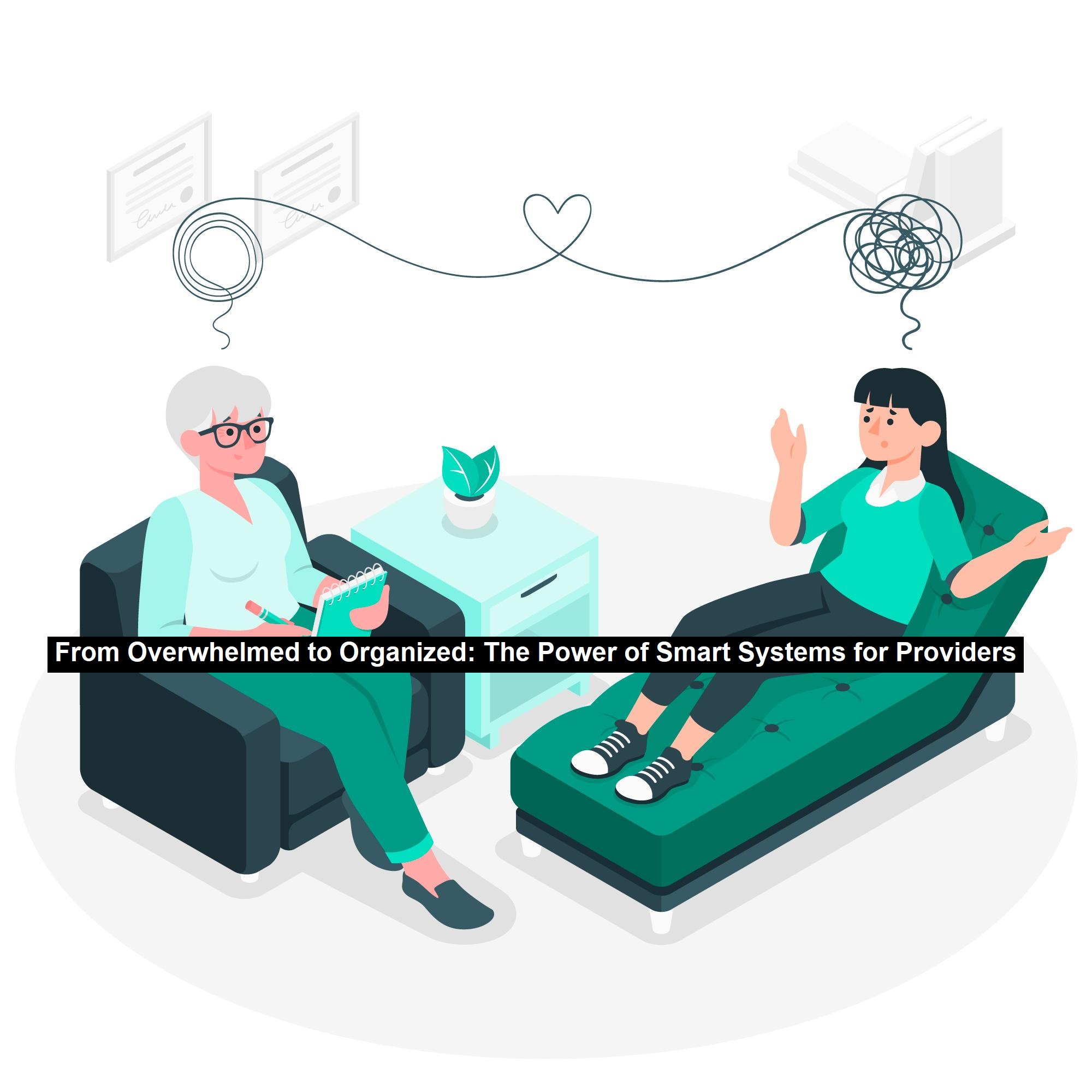From Overwhelmed to Organized: The Power of Smart Systems for Providers
Mental health care providers face a unique challenge. Unlike most medical fields, mental health care relies on complex communication, building trust, and forming long-term relationships. At the same time, providers must handle increasing amounts of administrative work: documentation, compliance, billing, scheduling, and navigating potential legal issues. As patient numbers increase and expectations go up, this balancing act can lead to burnout and inefficiency. Luckily, smart systems are changing the world of mental health care: smart systems specifically designed for mental health. These smart systems range from easy-to-use electronic health record software to professional-specific IT infrastructure that will help mental health care providers go from always feeling overwhelmed to a more ordered, reasonable, structured, and productive practice.
How Smart Systems Transform Mental Healthcare Practices
The correct technology does not replace, but rather supports, human contact. Thus, here are five primary avenues where intelligent systems can enable mental health care providers to be more organized, efficient, and effective in their practice.

1. Enhanced Documentation Through AI Progress Notes
Clinical documentation is an everyday operation for mental health professionals and one of the most arduous, labor-intensive tasks. Manually writing session notes, treatment updates, and follow-up notes can be extraordinarily time-consuming, taking away precious time spent with clients or decompressing time before the next client. Enter AI progress notes—a computer application that allows you to use voice-activated or plain-text natural language processing and machine learning to auto-generate structured notes. These applications offer intelligent suggestions, only present the required fields, and, over time, learn individual provider preferences.
More crucially, the notes produced with AI assistance mitigate the chances of generating an error or missing something impactful to client outcomes or compliance issues. The outcome is quicker clinical documentation, reduced cognitive load, and more energy spent on client care.
2. Streamlined Scheduling and Billing
Scheduling and billing appointments can be the most painful parts of running a mental health practice, especially when scheduling is done manually or in disjointed systems. Missed appointments can reduce overall revenue, and billing errors can delay payments or create frustration for both provider and client. Smart systems provide integrated systems that easily automate scheduling, process reminders, cancellations, and billing, including insurance claims and payment tracking.
Providers, for example, could see their entire week at a glance, reschedule a client in a single click, and automatically create superbills or invoices. These efficiencies enable providers to reduce administrative burden while giving clients a professional, problem-free front office experience.
3. Customized Workflows for Mental Health Specialties
In contrast to general medical software, systems focused on mental health are developed specifically for the needs of mental health. These systems facilitate workflows that include initial intake paperwork, emotional history, preferences for different therapy modalities, and risk assessments. In these systems, practitioners can also establish documentation for individual counseling, group therapy, family therapy, and medication management sessions.
Tailored templates and forms can reflect each provider’s methodology, whether it be CBT, DBT, psychodynamic therapy, or integrative methods. The level of customization created will facilitate that workflows align with clinical processes and not require clinicians to change their practice to suit awkward systems and irrelevant data points. It also guarantees continuity of care when sharing clients with colleagues or transferring clients to a different service.
Read: How to Eat for Your Gut Without Sacrificing Flavour
4. Data-Driven Insights for Better Decision-Making
Mental health professionals using smart systems can move from anecdotal observations to using real data to inform their decision-making process. Having advanced analytic tools provides real insight into treatment outcomes, session frequency, trends in client engagement, and even the productivity of the therapist. In time, this information can support decisions concerning changes in treatment, optimizing resource allocation for staff, and understanding gaps in services.
On a practice-wide level, providers can use data to understand which services are being most utilized, which demographic groups they are reaching (or not), and at what rate revenue trends are matching operational objectives. This information provides practices with strategic enhancements that are tied back to client-centered care patterns.
5. Improved Compliance and Security
It is critical to comply with privacy laws and clinical regulations in mental healthcare, where trust is crucial. Smart systems come with compliance features built in, including automatic HIPAA protections, secure access controls, encrypted communications, and detailed audit trails. These systems are updated continuously as state and federal law changes, so providers do not have to become legal experts to stay compliant.
Using role-based access, or customizable permissions, practices can also ensure that only the proper staff are accessing specific client details and confidentiality is protected at all levels. Compliance moves from being a reactive burden to a proactive strength.
End Point
Going from being overwhelmed to being organized is about being smarter and not harder. Smart systems designed for mental health providers can help them take control of their time, their documentation, and their practices. Better systems mean better practices, better workflow, more compliance, speedier documentation, focused practice, and better care.

